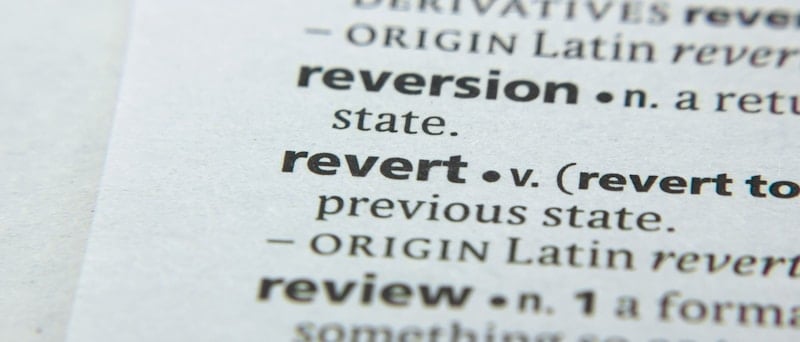If a certain term or phrase is in wide circulation or commonly used, the English language is usually accommodative enough to take that word or phrase in its fold at a certain point. However, such inclusion of new word(s) shouldn’t be done at the expense of ignoring grammar rules or the term’s meaning. The word “revert” is a proper English dictionary word, but the way it’s used in sentences in certain circles or parts of the world is not correct.
To correctly use the word “revert” in a sentence, make sure the sentence indicates returning to the earlier or original form of a given thing. Using the word to mean “response” or “reply” is incorrect. Also, “revert back” is wrong as the “back” is redundant or “revert” already indicates the same.
Keep reading to learn the actual meaning of the verb “revert”, how it gets frequently misused or paired with incorrect words, and a host of other things. If you think if you have never erred with the usage of the word “revert” in your writings, this article would either validate that or prove you wrong.
Revert – Definition
The verb “revert” essentially means to return to something – a previous topic, state, practice, etc. The word is a valid synonym for “return” or “rollback”.
Contrary to what some people believe – particularly the ones within business circles – reverting does not mean “replying” or “responding back”. The original meaning of the term certainly was not so. Some dictionaries may have, however, incorporated alternating meanings owing to the widespread usage.
The word “revert” is used not just in regular communication, but in certain specific fields as well. For example, in IT, “reverting” denotes restoring a document or file’s older version. For instance, a file could have turned corrupt, and “reverting” back to the earlier copy of the file or document from a backup essentially means salvaging the situation.
How To Properly Use “Revert” In A Sentence
As mentioned above, “reverting” means “returning to someone or something”. When using the word in writing, it’s not just important to get the meaning right but the sentence should also be logically correct. For example:
- Ice reverts to water when melted.
The above sentence uses “revert” correctly, and the sentence’s meaning is also correct.
The following sentence, however, is incorrect even if it has no grammar issues:
- Water reverts to ice when cooled.
The above sentence is problematic because the “science” it puts forward is wrong. Water cannot revert to ice as ice is not water’s original state. The sentence can be rectified if the word “reverts” is edited out. For example, “Water becomes ice when cooled.”
“Revert” And Email Correspondence
The verb “revert” is being frequently used in email correspondences as a replacement word for the phrase “respond to” or “to reply”. Most people who do use the word in place of “reply” do it out of sheer ignorance or because others in their business circles frequently use the term.
And then there are others who use the term to supposedly sound more “professional”. Unfortunately, what they do not realize is that by using “revert” in place of or to mean “reply” or “response”, they only come across as someone with bad grammar.
Unfortunately, the word “revert” has been so extensively used in lieu of “reply” or “response” in certain parts of the world that it has reached a point where it’s considered standard or not incorrect English.
Though wrong with its intended meaning, the following sentence would be deemed acceptable or correct in the Indian subcontinent and nearby regions:
- I shall revert to her with the certificates.
If the original or correct meaning of “revert” had to be considered, the above sentence would literally mean taking the certificates and becoming “her” – which obviously doesn’t make any sense. You simply cannot revert to “her” with the certificates. The sentence, however, has no grammar issues per se.
The correct version of the sentence would be something like:
- I shall get back to her with the certificates.
It’s advised to use the word “reply” instead of “revert”, to appeal to or not miff the purists of the language or people who know using “revert” as a replacement word for “reply” is simply butchering the language.
Here are a few more sentences that correctly employ “reply” instead of “revert”:
- He replied to her question with sadness.
- Kindly reply with the necessary details.
You may also use “respond” or “get back” in place of “reply” in the above sentences. If the aforementioned sentences had to have “revert” in them, they will not be replacing “reply” but the two terms would rather co-exist. Here is how the sentences would read:
- He reverted and replied to her question with sadness.
- Kindly revert to her and reply with the necessary details.
The above sentences may not have the best flow or sound to them, but those were used to simply drive home the point that “revert” is not another word for “reply“. When the two words are used in the same sentence, you will not be called out for ‘tautology’.
If you still think it’s absolutely fine to use the term “revert” to mean “to reply”, it’s your call. The Oxford Advanced Learner’s Dictionary, in fact, has incorporated “to reply” as the meaning of “revert” in its eighth edition. It has been marked as “Indian English” on the page, however, which denotes the usage is more widespread in and around the country.
Incorrect Usage Of “Revert” In Sentences
The verb “revert” is never immediately followed by the word “back” as the latter is needlessly repeating the same thing. The term “revert” already contains the reflexive perception of the word “back”. The phrase “revert back”, therefore, means “go back back”. The following sentences, for example, are grammatically incorrect:
- During my leisure time, I revert back to reading books.
- Kindly revert back till all your doubts have been fully addressed.
- Will reschedule things and revert back!
- We will investigate the matter and revert back at the earliest.
- It would be wonderful if she reverts back by then.
- Kindly revert back accordingly.
You should also not use the word “back” after “reply” as the word “reply” already implies the same. There are also some who say or write “return back”, which is also wrong. For example:
- She returned back to her hotel. (Incorrect)
- She returned to her hotel. (Correct)
Example Sentences With The Word “Revert”
Here is a fairly long list of sentences using the word “revert” correctly:
- We will revert to the subject below.
- Despite spending a good amount of time in the rehabilitation center, she reverted to her addiction.
- Though they told him to not discuss that matter ever again, he reverted to that worrying topic.
- When the lease finishes, the estate would revert to her aunt.
- He found it imperative, to secure a competent government, to revert to the Incas system.
- A three-year-old kid is not likely to revert to sucking its thumb again.
- Kindly do revert to her if you need further explanation on any of the points discussed in the last meeting.
- The publisher is unlikely to revert to employing the ISSN previously used.
- Is he determined enough to withstand the temptation and not revert to crime again?
- Many kids will revert to the previous development phase.
- Under ideal conditions, the spore could revert to its actively multiplying form.
- Once the pregnancy period is over, women invariably revert to eating unhealthy foods again.
- The proof lies in the ducks’ keenness and ability to revert to an aquatic lifestyle whenever an opportunity presents itself.
- If the government passes the bill to revert to how things were before, it will push the country at least two decades backward.
- It also brings up the broader question as to can civilized societies revert to primitive practices quickly.
- Exposure to allergens over a period could lessen inflammation revert hyperactivity of the airway to normal responsiveness.
- The rate at which the lung declines of a recently quit smoker would revert to that of a non-smoker.
- If not, they would revert to plan A, which is using last year’s system.
- Now isn’t the period to revert to draconian sanctions against people supporting abortion rights.
Here are a few sentences with the term “reverting”:
- The country was slowly but surely reverting to paganism and independence.
- After reverting to a normal state of mind, the consciousness that follows will not be able to recollect the incident.
- While remedies for constipation would help eliminate the issue, reverting to the bad eating habits could cause constipation return.
- Some changes in the game’s controls keep reverting to the default settings each time the game is restarted.
Conclusion
Using the verb “revert” to denote “response” is typical corporate-speak in some parts of the world. Most of the language or jargon used within business circles usually do not meander outside the sphere.
However, certain terms or the way they are used could make their way into regular correspondence. The usage of “revert” within business circles is influencing how the word is getting used in everyday communication, which should not be happening – even if it’s for brevity or speedier communication.
Shawn Manaher is the founder and CEO of The Content Authority. He’s one part content manager, one part writing ninja organizer, and two parts leader of top content creators. You don’t even want to know what he calls pancakes.




